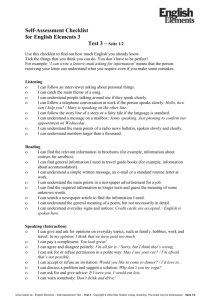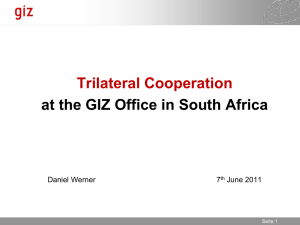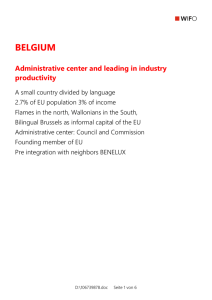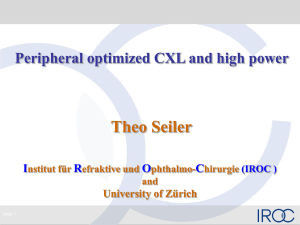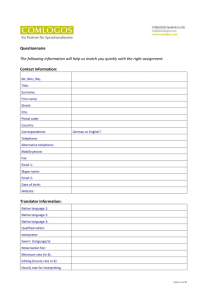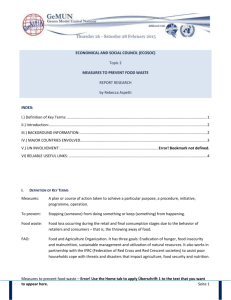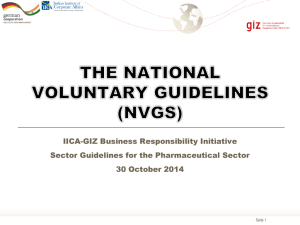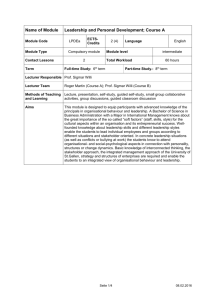Volkswagen PowerPoint - Leadership in Education
advertisement
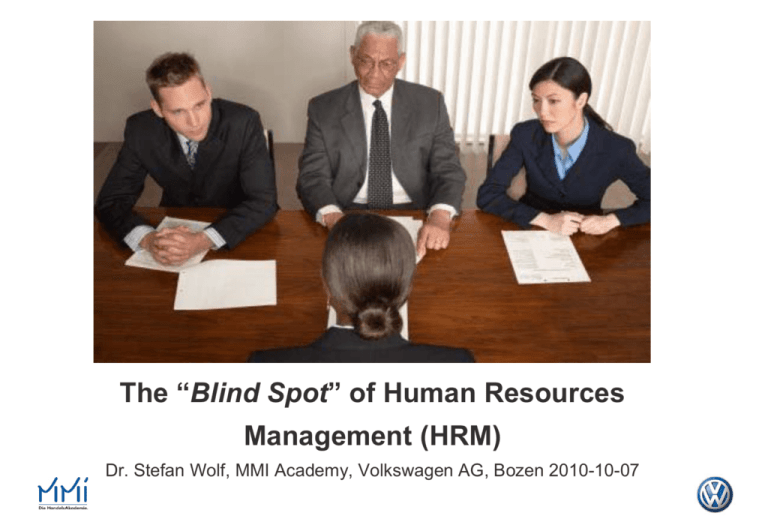
The “Blind Spot” of Human Resources Management (HRM) Dr. Stefan Wolf, MMI Academy, Volkswagen AG, Bozen 2010-10-07 Content – What I would like to talk about • Setting the Scene – FUTURE What “Contingency” means: two examples • The “blind spot” of HRM: some crucial points • HRM as “Positive Leadership”: Organizing the Learning Aptitude of a Company (a) Talent Management (TM) (b) Feedback Culture (c) Management by Objectives (MbO) (d) Assessment Centers as a “bottle neck” (e) Managing Paradoxes •Towards a Corporate Culture (CC) of the Second Step – Closing remarks Seite 2 The “Premium Strategy” is a contingent decision (first example) Decision System Phaeton is the “Flagship” of the Brand! CEO: “A Premium Car as a Blueprint is indispensible for the whole Brand Family!” VW Observation System Premium or Volume? – That’s the (open) question Communication System There are no decisive arguments, just good aspects and perspectives Seite 3 Water Consumption and Stakeholder Dialogue (second example) Market Sphere Profit Product Quality Customers Shareholder Coca Cola Compliance Sustainability Employees Farmers and Suppliers WWF and other NGOs Transparency Public Sphere Seite 4 Reliability & Trust The “Blind Spot” of HRM – some crucial points • “Drop your tools!” HRM and the problem of self-similarity • “The question is (also) the answer!” The blind spot of assessment centers (AC) • “One size fits all!” There is no “best or one way” in management • “Reasons instead of Transparency!” The futile search for a rational organizational structure Seite 5 Background “Cross the Border – Close the Gap!” • Companies are today much more in the public eye as “social agents” than was the case earlier. They have to justify the way they act (Stakeholder-Dialogue). In this respect values provide longterm orientation, also for HRM as Positive Leadership. • We are living in a knowledge society which is growing old. But knowledge is not something to possess but rather to acquire, so learning is a personal attitude and knowledge an open perspective. • Global companies operate more and more in structures of open meaning (complexity) and fluid boundaries (contingency). To cope with this confused and unclear situation, the companies need a new learning culture as a problem-solving program and they have to organize their own opportunities to learn. They need a “philosophy of the second step” as a future corporate culture. Seite 6 Go for more Democracy! – and take your Second Step ... • There is no way for companies to explain and ensure their organizational aims and structures by using scientific or logical approaches. The way they act might be successful, but it is always contingent. • Contingency means that a fact or a development could also be as good as it is by other ways or means. Contingent is what is neither impossible nor necessary; i.e. it can be different for the same good reasons! • Therefore companies would be more reliable and act in a better way, if they were transparent and open-minded in order to make a continuous and fair Stakeholder Dialogue possible. Go for more Democracy! • HRM plays a central part in this new concept of organizational behaviour and corporate culture: Structures are flat, decentralized and like a network, in order to link people to ameliorate the learning opportunities of the whole company. Let them take a Second Step! Seite 7 Learning Aptitude in a(n open minded) Corporate Culture (CC) Corporate Culture as a Problem Solving Program Decision System: Achieving Common Goals (“The Triple-Bottom-Line”) Issue: Sustainability in the VW CC Company Observation System: Building Common Realities “What is Sustainability about?” Real Case: CC is driven by engineers and feasibility Communication System: Coordinating Common Interests “What is feasible is sustainable!” Seite 8 (a) Talent Management (TM) • TM needs time and refers to personal development and organizational structures. It is a certain kind of “job sculpting” (job description, work-life-balance). • Companies are brands. Either their values and principles are attractive for High Potentials or not. HRM means scouting and sculpting; i.e. searching but also developing new and old talents (motivation for lifelong learning). • To my mind, customer orientation and employee satisfaction are closely related. So TM also means looking for employees who are first of all customer-oriented. HRM has to ensure appropriate working conditions. • It is a blind spot of HRM to narrow the view down to formal qualification (especially in Germany). To be professionally qualified is basic, but to be successful in the longer term depends on more than just specialized skills. Seite 9 (b) Multi-Rater-Perspective (360o feedback) • A well-developed feedback culture is indispensible for an open-minded corporate culture and its learning opportunities. Why not look at social networks and learn from the way people make and stay friends, become a follower of somebody and so on. Maybe, it is going too far to compare both worlds, but it is interesting (self-similarity of facebook and company). • Companies should mould institutions to maintain the feedback culture and open it (maybe to Stakeholders like social networks). A good feedback culture is characterized by open structures and open-minded discussions. Employees rate their superiors by marks or grades, analyse SWOT (an employee questionnaire) and have appraisal interviews (permanent). • Schools can learn from companies how to deal with this kind of feedback. Seite 10 (c) Management by Objectives (MbO by Peter Drucker 1954) • Management by Objectives (MbO) leads by goals (participative goal-setting) and common values (choosing a course of action and decision making). • In a certain way the manager becomes a steward for his / her employees (subordinates). • Motivation – involving employees increases job satisfaction and commitment. • Coordination – frequent reviews (appraisal interviews) to maintain communication according to the common goals and values reduces “fire-fighting” (task forces) and offer timely possible solutions (instead of solving problems). • But also MbO (even it is a strategy of empowerment) has to be aware of blind spots: values must be ensured (you cannot change them every year), goals must be achievable (ambitious, but realistic) and participation must be true (not only a word). So you take your second step … Seite 11 (d) Assessments as a “bottleneck” • In Assessments (AC) Volkswagen examines problem-solving (cognitive capacities), decisionmaking (reasoning powers), Leadership competency, communication (appraisal interviews), ambition and attitude, motivation to learn (change), entrepreneurial competencies. • The problem is that each procedure to select the future leaders has its weaknesses: AC tend to self-similarity, observers are not neutral (have their blind spots), participants are nervous and do not perform as usual. • Selection without AC is also difficult. Superiors judge subordinates arbitrarily, support followers (in order to have “fans”) and prevent good employees from making a career (in order not to lose them). • There is no best way and of course not only one way to select high potentials: The aim is to manage not to reduce complexity! Seite 12 (e) Managing Paradoxes “Paradoxes I now see to be inevitable, endemic and perpetual!” There are different kinds of paradoxes in companies: Some of them are inevitable, like the still-unsolved problem between headquarters and local units or profit centers in a value chain (i.e. ‘purchase’ vs. ‘quality’). Some of them are not intended, like in assessment centers (AC) and the selection of future leaders (self-similarity) or like contradicting soft skills: team-player vs. decision-making, ambitious but loyal. Some of the paradoxes seem to be generated, e.g. entrepreneurship within a company or open structures for learning and a closed-door policy (innovations). Paradoxes are not a logical problem (you can’t resolve them), they are a practical question (you have to deal with them). Seite 13 Blueprints of Employability (blind spots of HRM) Blueprints Reasons of Selection Employment STAR (representing 9 % in the Coordination and Control Labour High Potentials Professional Standards Labour Qualification Professional Know-How company) ENGINEER (repr. 31%) (scientific knowledge) COMMITMENT (14%) Passion Fit / Match Team player / Communication BUREAUCRACY / CONTROL Money Competencies (14%) Formal / direct (transactional) Seite 14 Selection beats Education! Intelligence is highly congenital; i.e. to a great extent it is genetically (hereditarily) determined how intelligent we are. So it is better to focus more on the selection of new employees than to invest in their vocational training. Hypothalamus Seite 15 Value Management and a New Learning Culture Market Sphere Product Quality Economic Value Added (EVA)/ Profit work sphere Employees Shareholders Learning Organization Partners & Suppliers Public Affairs/ NGOs Transparency Public Sphere Seite 16 Reliability & Trust financial sphere Customers Schools and their stakeholders (interest or pressure groups) Public Transparency / Common Interests Education / Learning Students Teachers Parents School Government Economy Qualification / Professional Skills Costs Seite 17 Standards / Ratings The difference between transactional and transformational Leadership is “positive” TRANSACTIONAL TRANSFORMATIONAL •Working is only a transfer of money vs. workforce. •Employees are human capital which has to be controlled. •Employees get their directives and only act on instructions. •Employees are less loyal. •Employees are not really willing to change and are not open to innovation. The relationship is defined by common goals. Employees have important knowledge and need respect. Employees are ‘entrepreneurs’ and use their own capacities. Employees are highly satisfied. Employees feel deeply responsible for the whole company and its future. Seite 18 The “Blind Spot” of HRM – Some closing remarks • Towards a HRM of a Second Step Try harder: concepts and models are nothing more than a helpful start • “Go for more democracy!” – companies have to become more democratic POSITIVE LEADERSHIP • Organizing learning opportunities – a company is as good as its readiness to deal with mistakes • Managing Paradoxes companies have to cope with complexity and contingency • Positive Leadership and Talent Management Awareness of individuality and empowerment Seite 19 For a bitter end … You cannot treat a car like a human being – a car needs passion (love) (Walther Röhrl, Racing Driver especially for AUDI) BMW 5er Seite 20 Watch your Step – and be aware of your own Blind Spots (like me)! CV Dr. Stefan Wolf, born 1963. Degree in Political Science 1988 and PhD in Philosophy 1994. Professional career landmarks: EXPO 2000 in Hannover, Prognos AG Basel (2001 Switzerland), Das Bildungshaus GmbH and Volkswagen AG (since 2002). Chaired the department of Corporate Culture at AutoUni (2007) and is now responsible in the VW dealer academy for the teaching program and corporate communication.

